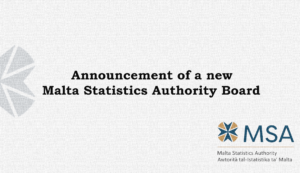Following a brief but intensive negotiating process, the Malta Statistics Authority (MSA) and the Union Ħaddiema Magħqudin (UĦM) signed a new six-year term collective agreement on behalf of all National Statistics Office (NSO) employees.
The signatories to the agreement were Dr Carl Camilleri the MSA Chairman, Mr Etienne Caruana the Director General NSO, Union representatives Ms Antoinette Aquilina and Mr Mario Sacco, and Mr Andre Caruana on behalf of NSO employees. The signing of the agreement was witnessed by Mr Paul Zahra, Permanent Secretary for the Ministry for Finance.
The collective agreement builds on past achievements, but it also enables the organisation to meet the ever-growing statistical demands required on a local and international level. In doing so, NSO employees will benefit from an improved remuneration package and enhanced training possibilities, while operating in a healthy working atmosphere. Over the past years, significant effort has been dedicated to enhancing employee welfare, and the organisation will continue striving to improve standards.
The NSO’s most important resource is its workforce. This collective agreement dovetails with NSO’s modernisation strategy. The Office is investing in cutting-edge technology to enhance efficiency in statistical production, creating both employment and training opportunities in the process. Hopefully, a spin-off of the collective agreement will be a larger pool of adolescents pursuing education in sciences subjects, such as statistics, economics, and data science.
The signing of this collective agreement would not have been possible without the professionalism and cooperation demonstrated by the Industrial Relations Unit (IRU) within the Office of the Prime Minister, the UĦM – Voice of the Workers, the Ministry for Finance and staff representatives who worked hard to see this agreement come to fruition.




